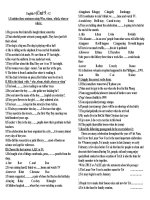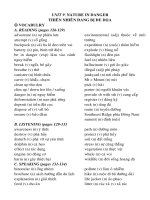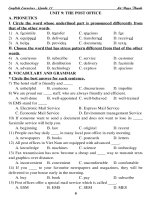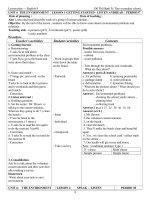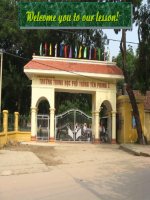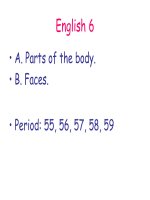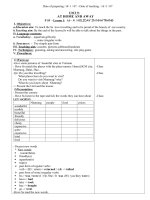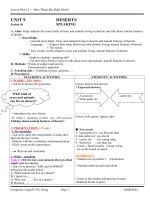Unit 9 Which
Bạn đang xem bản rút gọn của tài liệu. Xem và tải ngay bản đầy đủ của tài liệu tại đây (93.83 KB, 4 trang )
Relative clauses Which
A. Aims:
To help ss to get acquainted with relative clause: Which. Then they can do Ex
with them.
B. The contents:
II. Which (vật mà, cái mà) thay thế cho chủ ngữ chỉ người trong câu thứ 2
1.Nếu chủ ngữ câu 1 là chủ ngữ câu 2:
Eg1: The reading table is for reading. It is in the middle of the room.
-> The reading table which is in the middle of the room is for reading.
Eg2: The street is very wide. It leads to my school.
->The street which leads to my school is very wide.
Eg3: This watch is a wonderful gift. It was given to me by my aunton my 15
th
birthday.
Eg4: That book is mine. It has 340 pages.
CN (câu 1) + which + câu 2 bỏ chủ ngữ + phần còn lại câu 1.
that
2. Nếu tân ngữ câu 1 là chủ ngữ câu 2.
Eg1: I bought a picture. It was very valuable.
-> I bought a picture which was very valuable.
Eg2: They are good books. They might interest children of all ages.
Eg3: These are my shirts. They are very expensive.
Eg4: On my mom’s birthday myy dad gave her roses. The roses were very sweet
and beautiful.
Cả câu 1 + which + câu 2 bỏ chủ ngữ.
that
*Which (vật mà) gọi là đại từ quan hệ dùng để nối 2 câu đơn thành 1 câu ghép.
Which thay thế cho chủ ngữ chỉ vật trong câu thứ 2 và luôn đứng ngay sau
danh từ được thay thế của câu 1.
Ex1. Chon 1 từ có cách phát âm khác với các từ còn lại.
1. third threat thus * thunder
2. clothes gone * drove ghost
3, pleasure * sound same best
4. growth prow *(mũi tàu) borrow row
5. birth with they * fifth
6. wave pavement engage average *
7. leaf of * off deaf
8. sure * sigh sing same
9. houses * faces horses sources
10. loud mouth southern * boundary (đg biên giới)
Ex 2: Nối câu dùng Which.
1. The bicycle has only a wheel. It is often used at the circus.
2. The Thames is a beautiful river. It flows through London.
3. The car is very expensive. It has just bought by Mr. Pike.
4. I lost a pen. It is very good.
5. The house was built 20 years ago. It’s now being converted into a hotel.
6. The book consists of four parts. It has been translated into French.
7. He works in a factory. It makes bicycles.
8. The train broke down twice on that day. It arrived two hour later.
9. These are my keys. They are used to open the front door and back door.
10. You can buy these things at Ben Thanh market. The market is in the center of
HCM City.
Ex3: Nối câu dùng Who hoặc Which.
1.He is the man. He painted my house.
2. What is the name of the boy? He phoned you last night.
3. What happened to the money? It was on my desk.
4. They are the people. They offered Sue a good job.
5. Mr. Ba’s car has now been found. It was stolen last week.
6. She is the person. She gives me a lift to work.
7. The lock has now been repaired. It was broken.
8. Most of the people are nice. They work in my office.
9. This is the sweater. It was bought on Sunday.
10. The people have moved. They used to live in that house.
11. The teacher punished the student. This student was naughty.
12. I like to write to friends. These friends are living far away from me.
13. I bought some pencils. They are different colors.
14. She ate an apple. The apple was still green.
15. You had dinner with the girl last night. She has gone now.
Ex 4: Viết lại các câu sau sao cho nghĩa câu không bị thay đổi.
1.Shall we use gas instead of burning coal?
(suggest)
…………………………………………………………………………………
2. How about reducing the amount of water we use every day?
(we)
………………………………………………………………………………………
3.What about using energy- saving appliances?
(should)
………………………………………………………………………………….
4.Why don’t you install a burglar alarm in your house?
(suggest)
…………………………………………………………………………………
5.My sister looked after our children when we were away.
(took)
……………………………………………………………………………………
6. Tom failed the exam because of his laziness.
(Because)
……………………………………………………………………………
7.Unless we reduce the use of water and electricity, we’ll have to pay more this
month.
(If)
………………………………………………………………………………………
8. Lan is the better cook than Hoa.
(as)
……………………………………………………………………………………….
9.The owners of the restaurants are usually very rich.
(who)
……………………………………………………………………………………
10.Their wedding was held in a very lovely church.
(which)
…………………………………………………………………………………
Ex 5:Đọc đoạn văn sau và làm theo các yêu cầu sau đây.
Sending cards is a widespread custom in Britain today. The British have been
sending cards since Victorian times when wealthy families started to send
Christmas greetings. In the 1980s the card industry rapidly expanded as
celebrations became more and more commercialised. There are cards for every
occasion from buying a house to having a baby and, more recently, cares for
getting a new job, getting a divorce or just saying “Sorry”. More than 100 million
Christmas cards are sold in Britain every year. However, cards are no longer
confined to special celebrations such as birthday, because there are many less
important occasions when people send cards to each other.
Vocab:
Widespread(adv): rộng khắp
(to) expand: mở rộng
Commercialized(adj): thương mại hóa
(to) confine: dùng cho
a.Dịch đoạn văn trên sang tiếng việt.
b. T or F
……….1. Americans began to send cards in Victorian times.
……….2. The card industry quickly expanded because people commercialised
celebrations more and more.
……….3. You can get cards for divorce as well as buying a house.
……….4. 100 million cards are sold in Britain every year.
…….5. Cards are confined to special celebrations.
